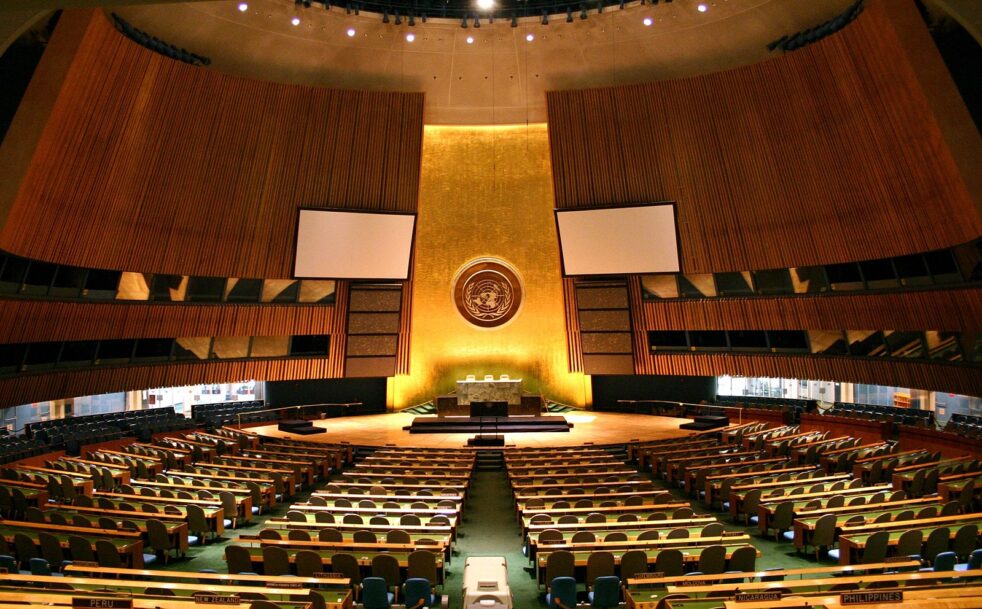The 78th United Nations General Assembly (UNGA) convened in the iconic Manhattan complex last week from Tuesday, Sept. 19, through Tuesday, Sept. 26. Leaders from across the world spent a week in New York
City debating worldwide issues.
Since the United Nations (U.N.) Charter was drafted in 1945, the organization has worked towards maintaining peace, protecting human rights and providing humanitarian assistance around the world. In the post-World War II turmoil, the U.N. was created to give participating nations a voice and platform to air out issues, plans and requests in a neutral environment.
Aside from emergency sessions, the UNGA typically meets each third week of September with all member states simultaneously discussing the worldwide scope of issues. Some of the biggest topics this year included the Russia-Ukraine war, climate change, ongoing COVID-19 concerns and worldwide economic issues.
There were over 145 countries present at the UNGA this year, with representatives varying from Presidents to low-level diplomats. One of the most notable attendees was Ukrainian President Volodymyr Zelenskyy, as this was his first in-person appearance at the U.N. since Russia’s invasion of Ukraine in 2022. Of the five permanent U.N. Security Council members, only one, U.S. President Joe Biden, was in attendance. The other members, including France, the United Kingdom, China and Russia cited various reasons for their absences.
The UNGA is structured in 15-minute speeches for each country to deliver whatever remarks they see fit. Members of the assembly have the right to reply and voice any rebuttals.
U.N. Secretary-General António Guterres opened the assembly with some advice for the world leaders in the room.
“Leaders have a special responsibility to achieve compromise in building a common future of peace and prosperity for our common good,” Guterres said.
Though the U.N. covers countless global issues, there are quite a few that specifically pertain to college students, including the Russia-Ukraine war, which has had a massive impact on the economic state of the
world and climate change.
President Biden used his short 15 minutes to smooth relations with China during his speech and to pledge the United States’ continuing support of Ukraine in their war efforts.
“We must stand up to this naked aggression today to deter other would-be aggressors tomorrow,” said Biden.
Polish President Andrzej Duda followed with a comparison of the Russian invasion of Ukraine to that of Nazi Germany and the Soviet Union during World War II and asked the U.N. to hold Moscow accountable.
Following President Duda, President Zelenskyy took the stage and used his time to make a plea to the U.N. to stand up to Russia’s aggression, seeking support for his troops. President Zelenskyy used a global plea to convey the message that the Russia-Ukraine war has worldwide effects, citing food insecurity and weaponization of energy such as oil, gas and nuclear energy.
These consequences are a large part of the continuing inflation and gas price increases in the United States and prove to be a large point of contention as the United States Presidential election season commences. With investor uncertainty, the toppling of supply chains disrupted trade and higher priced commodities and goods, there are many reasons why world leaders are pushing for peace in the region.
Additionally, members of the U.N. seemed to prioritize climate change. Secretary-General Guterres has barred nations without “new and meaningful action” from speaking about climate change. With these efforts, the U.N. hopes to give the spotlight to those who can contribute concrete efforts to the fight against climate change. For students across the nation, climate change has been a unilateral concern for young people who are unsure if the environment will be able to keep up with their lifespans.
“Humanity has opened the gates of hell,” Guterres said about climate change.
The reach of the U.N. has been placed under question over the past few decades. With the bureaucracy and policy set in place by the U.N. Charter, the council is only permitted to take physical action in certain cases. For example, military intervention can only take place when the U.N. Security Council passes a resolution.
Aside from that, the U.N. is allowed to recommend, formulate, investigate, advocate and exercise their organ of authority globally on most issues. It is essential to recognize that the U.N. has contributed to many peace efforts globally and played a part in reunifying the world post WWII, however, there have also been many major losses and points of conflict.
With its conclusion on Tuesday, the UNGA stage is effectively dismantled until the following fall. Despite this, the U.N. General Assembly has remained an important annual event, shedding light on pressing matters and opening the door for constructive conversation about our futures.
